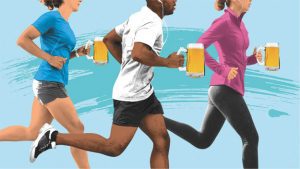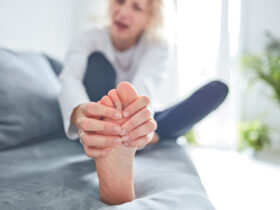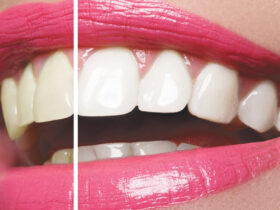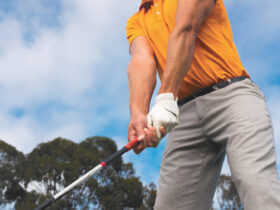By Shannon Willits, Master Pilates Educator
 A rguably, one of the best benefits of building muscle mass is an improved metabolism. The more muscle you have, the more calories your body burns at rest to keep it functioning! This means that you can eat more without gaining weight.
A rguably, one of the best benefits of building muscle mass is an improved metabolism. The more muscle you have, the more calories your body burns at rest to keep it functioning! This means that you can eat more without gaining weight.
Alcohol makes your metabolism less efficient, which can lead to weight gain. Alcohol slows down the chemical reactions that break down fat. Alcohol distracts your metabolism and makes it less productive. While your body is busy breaking down alcohol, other chemical reactions take a back seat and slow down.
Having more muscle mass burns more calories because they require energy to contract and relax. Meaning when you’re not exercising, muscle cells are burning calories. Basal metabolic rate (BMR) accounts for 60% of our body’s energy expenditure. A higher percentage of this energy comes from lean muscle mass than fat. This means the more muscle mass in your body the higher your total energy expenditure, which is good for losing or maintaining a healthy weight. If you want to increase your BMR, resistance training is a great way to do it!
The Process of Muscle Growth
When you engage in resistance training, you create tiny, microscopic tears in the muscle fibers. This damage isn’t harmful; instead, it sets off a trigger of muscle repair and growth. This response activates satellite cells to multiply and move toward the “injured” areas and merge with the muscle fibers increasing the density and number of “myofibrils” leading to muscle growth.
Key Factors Affecting Muscle Growth:
• Nutrition – Proper nutrition is critical for quality muscle growth. Furthermore, consuming adequate protein is essential for the growth and repair process.
• Hormones – Testosterone, growth hormone and insulin-like growth factors are important for muscle growth and BMR
• Exercise – Resistance training (which is a form of strength training) is what stimulates muscle development.
• Recovery – Sleep is when most muscle repair and growth happens.
Alcohol Impacts Nutrient Absorption and Protein Synthesis
Alcohol can interfere with nutrient absorption by damaging the cells lining your stomach and intestines, impairing their ability to absorb nutrients, including protein. Protein is the main ingredient in muscle repair. Alcohol is high in empty calories which can lead to malnutrition.
Alcohol can affect muscle growth in many ways, from decreasing protein synthesis and hormonal balance, causing dehydration and hindering nutrient absorption. In one study that looked at the effects of alcohol consumption in physically active people, there was a whopping 37% reduction in muscle protein synthesis when alcohol was consumed after exercise.
Alcohol and Hormones
Testosterone stimulates protein synthesis and inhibits protein breakdown. Studies suggest that alcohol lowers testosterone levels, negatively impacting muscle development.
Growth hormone also stimulates protein synthesis and promotes the use of fats for energy. Alcohol inhibits secretion of growth hormone, disrupting the beneficial effects in muscle development.
Alcohol Inhibits Muscle Development when Exercising
Muscle tissue is in a constant flux of building and breakdown. To build muscle, the process includes stimulating muscles by resistance training. When we drink alcohol, it inhibits the pathways that build muscle.
Alcohol impedes signals to build proteins which activate the molecules responsible for muscle repair. Drinking alcohol also induces insulin resistance. Insulin is a potent muscle growth stimulator.
Alcohol and Recovery
After a challenging workout your body needs time to recover. It is during recovery that most muscle repair and growth occurs. Recovery after resistance training is the time to repair damage, restore fluids, replenish nutrients and build new muscle.
As discussed, earlier alcohol disrupts protein synthesis, a crucial part of muscle repair. Alcohol also increases inflammation, prolonging recovery after resistance training.
Good sleep is important for muscle growth and recovery. It is during sleep that our body releases growth hormones to repair and develop muscles. Alcohol decreases the deep restorative sleep phase when most muscle recovery and growth occurs.
In essence, alcohol is a terrible trifecta when it comes to muscle growth by impairing your strength, causing havoc on your hormones and disrupting your post-workout recovery process.
Kia Stork an avid tennis player and former social drinker stated, “after I stopped drinking altogether my muscle recovery was faster and I was less achy after my matches.”
Strategies for Building Muscles at Home
Strength and/or Resistance training is ideally done in a fitness facility or Pilates studio to add load to the muscles. However, there are many body weight exercises that can easily be performed at home. Squats, Lunges, Planks and Push-Ups can develop large muscle groups when performed 3-5x per week.
The Pilates studio is an ideal environment for resistance training because the Pilates Method focuses on alignment, breathing and core strength, what I call the ABCs of Pilates. A common misconception is that Pilates is all stretching, however very different from yoga, using Pilates apparatus focuses on strength and flexibility simultaneously. Many of the twisting exercises like Spine Twist and Saw are detoxifying because of the torso rotation.
Tips for Minimizing the Negative Effects of Alcohol
Drinking in moderation is crucial. Being strategic and giving your body time to recover after heavier drinking allows your body to rehydrate and restore its balance of nutrients and hormones. Staying hydrated is especially important if you’re drinking alcohol after a workout.
Shannon is a Master Pilates Educator for Club Pilates and a Functional Movement Specialist.









